MoomsTeatern is a professional inclusive theatre company in Malmö, Sweden, that employs actors with learning disabilities and non-disabled freelance actors1. It aims to produce performing arts of high artistic quality.
This blog post reflects on my thoughts and impressions of MoomsTeatern, which I visited during a study trip to Sweden as part of the Creativity and Arts in Social and Health Fields (CRASH) master’s degree programme of Metropolia University of Applied Sciences. Also, Dennis Mortensson, who is one of the actors at MoomsTeatern, shares his experiences concerning his work.
A day at Mooms Teatern with my CRASH community
“People with dis/abilities should rather be givers, not takers”. This phrase by Sandra Johansson, the executive director of MoomsTeatern, was stuck in my mind while we were leaving the theatre. But let me share the story from the beginning.
We were there, entering the theatre when Sandra Johansson warmly welcomed us. She took us to her office where we had the chance to sit in a circle and discuss. She was open to getting to know us, telling us about the history of the theatre, and answering all our questions about their work. Later, we also had a chance to follow one rehearsal session of their upcoming production “Alla heter Knut” (Everyone’s called Knut). In this way, I can say that we had a full experience of what MoomsTeatern is about.
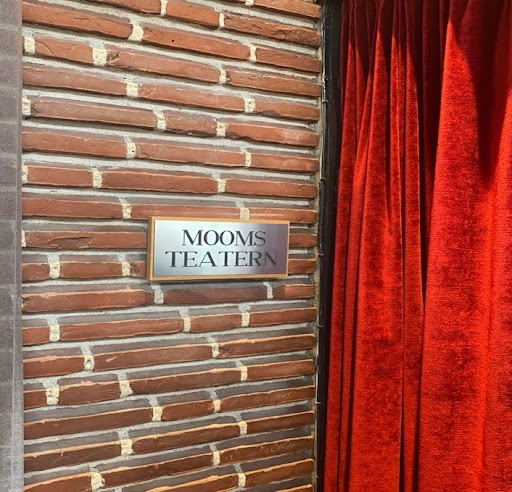
Picture: Xanthippi Panagiotou
My spectrum of emotions during the rehearsal
Watching all the actors with different abilities perform on the stage was, at first, very touching. I felt inspired and moved by their talent and courage to be on stage. But later my emotion changed to anger. This should not be an emotional spectacle, but an ordinary example of a theatre play rehearsal.
I realised that we are not used to watch dis/abled people perform and this, in general, contributes in some way to our society and that’s why we become emotionally charged when we see this. Contemporary society makes dis/ability invisible, by excluding people from equal participation.
My heart and mind are full, flourished, and at the same time troubled. Too many questions and ideas cross my mind. “Why is our society still categorising people on the basis of their way of being in the world? Who is lucky enough to match the standards of the long checklist and be called ‘able’? How are we going to deconstruct all the ableist assumptions and construct a bridge connecting people with different abilities?” These questions made me curious, and I had to look for answers in the literature of dis/ability studies.
Dis/ability as a social construct
Dis/ability is a social construct, meaning that the way people give meaning and understanding to dis/ability is influenced by society’s beliefs about ability. Contemporary society has some preconditions, like being able to live independently, to walk, and to manage everyday struggles alone. If someone does not match these preconditions, this individual is perceived as different2. In this way, people tend to be categorised according to their abilities3. If you match these standards, you are considered able and you can enjoy all the possibilities of life. However, if you need some support to participate in life’s activities, you are seen as disabled, thus unable or nonfunctional to participate in certain activities.
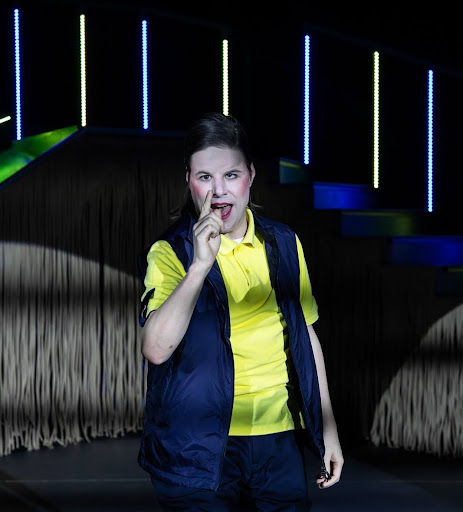
Alla heter Knut (the present production), photographer Bodil Johansson, Moomsteatern.
This phenomenon makes dis/ability invisible. Just a glimpse at a simple example of how disability is little or not at all represented in contemporary television, theatre, or cinema, illustrates this phenomenon. In this way, dis/abled people, as Sandra Johansson mentioned, tend to be only takers of services provided by a system that excludes and disempowers them.
It does not mean that all people should be the same. We should not ignore differences and how impairments can be difficult for people who experience them. However, it is our society that gives meaning to these differences and values or devalues them. It is time to recognize that we are all different in society that chooses either to exclude some people who are not lucky enough to be called ‘able’ or finds the right way for equal participation.
Social inclusion and participation
From a humanist worldview, every human is equal and part of the community. However, at the same time, people with dis/abilities are often excluded, and at risk of reduced opportunities for social participation. According to research4, social inclusion on an individual level is linked to three domains.These three domains are:
- Participation
- Connectedness and a sense of belonging (e.g. friends, family, broader community)
- Citizenship (political and general community engagement, demonstrating altruism, and having access to community services)
Participation is identified to constitute an important predictor for social inclusion. The three domains of participation; the economic, the social, and the spiritual, play an important role in how individuals contribute and participate in their community. The possibilities they are given for training and employment, for being a valuable member in a community with similar beliefs and interests, and by taking and giving, may be a pathway for advancing social inclusion (4).
And that’s exactly what MoomsTeatern is doing by including people with intellectual disabilities as equal partners in their creative process. Mooms’ focus is on ‘artistic equality’ and all the actors are receiving equal pay for equal work.
Listening to the voice of the actor Dennis Mortensson
As we are talking about inclusion and participation, we cannot ignore the voices of the people who are involved. That’s why I wanted to know more about Mooms’ inclusive work from the actors themselves. Sandra helped me to realise an online interview, despite the language barrier and time constraints. As a result, I am happy to cite the answers of the actor Dennis Mortensson to my questions.
When did you first discover a talent for drama?
My sister was going to a short theatre summer course in 2002, when I was 14, and I wanted to join her. I didn’t really know what theatre was, I just wanted to hang out with my sister. My sister didn’t get into acting at all, but I did. I found an after-school group for people with disabilities that met once a week to create theatre. I was there, a bit on and off, for years and in 2009 I was contacted by the artistic director at MoomsTeatern, who had seen one of our plays and wanted me to join a workshop. They saw something in me and offered me an acting course that MoomsTeatern had put together. I started the course in 2010 and three years later I got a job as an actor at MoomsTeatern.
What is difficult for you when you do rehearsals?
Learning takes time, to remember the text and the scenarios that we have put together. But it is possible with hard work and a lot of practice. You need to have time to talk to someone about your role and about the play to understand the context and what my character should be like. We get that kind of support at MoomsTeatern.
How would you describe, with three words, your work at MoomsTeatern?
Developing. Fun. Challenging.
What do you like the most about working in MoomsTeatern?
To meet the audience and feel their response. To be taken seriously in my work and receiving a salary for doing my job.
How do you think that being an actor with a disability can impact visibility for viewers?
The audience sees that we are people like everyone else. Society has created some kind of view of us with disabilities that we are different and outsiders, that we are people who cannot contribute with anything. But it is society that has created this and not us individuals. I am who I am, and all my colleagues are who they are, we cannot be anyone else. Just like you.
What advice would you give to other people with or without a dis/ability who would like to become an actor/actress?
Follow your dream. Dare. Don’t let others tell you that you can’t. Believe in yourself. But understand that it won’t be easy, YOU have to do the work. It is possible if you work for it. It will take time. It doesn’t happen overnight; you have to be patient. Accept that it takes time.
I warmly thank Dennis Mortensson and Sandra Johansson for this interview, and I would like to end this blog post with a quote from Dennis, “Dare. Don’t let others tell you that you can’t”.
Author:
Xanthippi Panagiotou is an Occupational Therapist (OT) from Greece. She has been working as an OT for four years in different health settings, utilising art-related and creative approaches. Currently she is a student in CRASH, Master’s Programme in Creativity and Arts in Social and Health Fields, in Metropolia University of Applied Sciences. Her academic interests that influence her master’s thesis topic are critical disability studies and inclusion.
Sources:
1. Moomsteatern: https://moomsteatern.com/en/start/
2. Campbell, F. K. 2009. Contours of Ableism: The Production of Disability and Abledness. https://doi.org/10.1057/9780230245181
3. Goodley, D. 2014. Dis/ability Studies: Theorising disablism and ableism (1st ed.). Routledge. https://doi.org/10.4324/9780203366974
4. Cordier, R., Milbourn, B., Martin, R., Buchanan, A., Chung, D., & Speyer, R. 2017. A systematic review evaluating the psychometric properties of measures of social inclusion. PloS one, 12(6), e0179109. https://doi.org/10.1371/journal.pone.0179109

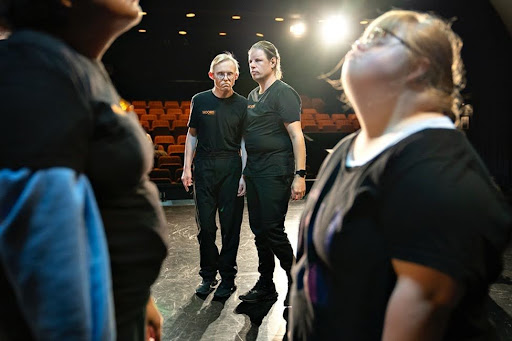
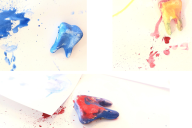
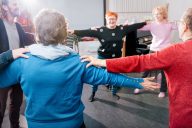

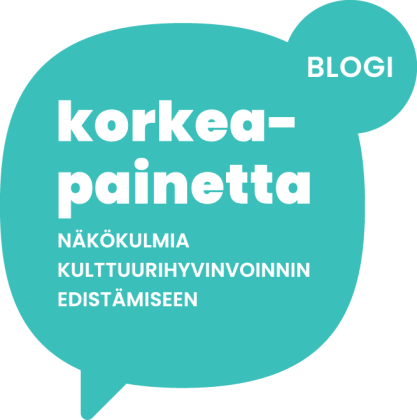
2 Kommenttia
eeonai
bmt1yb